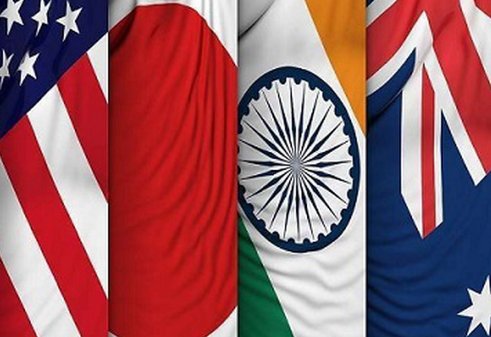Washington: The Foreign Ministers of Japan, India, Australia and the US Thursday held a virtual meeting of the Quad during which they reaffirmed their commitment to strengthen cooperation on advancing a free and open Indo-Pacific region, including support for freedom of navigation and territorial integrity.
US Secretary of State Antony Blinken, External Affairs Minister S Jaishankar, Australian Foreign Minister Marise Payne and Japanese Foreign Minister Toshimitsu Motegi attended the 3rd Quad Ministerial Meeting – the first under the Biden administration.
Quad ministerial is an informal grouping of Australia, India, Japan and the US. The four countries had in 2017 given shape to the long-pending proposal of setting up the “Quad” or the Quadrilateral coalition to counter China’s aggressive behaviour in the Indo-Pacific region.
The ministers “reiterated their commitment to the Quad meeting at least annually at the Ministerial level and on a regular basis at senior and working levels to strengthen cooperation on advancing a free and open Indo-Pacific region, including support for freedom of navigation and territorial integrity,” State Department Spokesperson Ned Price said.
“The ministers discussed Quadrilateral cooperation on COVID-19 response and recovery and climate change and committed to working together to address these global challenges,” Price said.
They also discussed countering disinformation, counterterrorism, maritime security, the urgent need to restore the democratically elected government in Myanmar, and the priority of strengthening democratic resilience in the broader region, he added.
“The participants reaffirmed their mutual support for ASEAN (Association of Southeast Asian Nations) centrality,” he said.
The foreign ministers of the four countries held their first meeting under the ‘Quad’ framework in New York in September 2019. The second Quad meeting was held in Tokyo in October last year.
Ahead of Thursday’s meeting, the Pentagon said that India is a critical partner, especially when one considers all the challenges in the Indo-Pacific region.
“It (India) is a very important bilateral relationship that we have and particularly military-to-military relations. India is a critical partner, especially when you consider all of the challenges in the Indo-Pacific region,” Pentagon Press Secretary John Kirby told reporters Wednesday.
“What I can tell you plainly is that the (Defence) Secretary is prioritizing this relationship, wants to see it continue to grow and develop and to get stronger and he looks very much looking forward to working on initiatives to do just that,” Kirby added.
While announcing the meeting, Price had said that the “discussion with the Quad foreign ministers is critical to advancing our shared goals of a free and open Indo-Pacific and rising to the defining challenges of our time, including coordinating our efforts on COVID-19 response as well as climate change.”
Recent media reports in Japan have stated that a Quad leadership summit was in the works. So far, there has been no confirmation from the Biden administration.
Defence Secretary Lloyd Austin would be supportive of such a gathering, Kirby said in response to a question.
The evolving situation in the Indo-Pacific region in the wake of China’s increasing military muscle flexing has become a major talking point among leading global powers. The US has been favouring making Quad a security architecture to check China’s growing assertiveness.
China is engaged in hotly contested territorial disputes in the South and East China Seas. Beijing has also made substantial progress in militarising its man-made islands in the past few years.
Beijing claims sovereignty over all of the South China Sea. But Vietnam, Malaysia, the Philippines, Brunei and Taiwan have counterclaims. In the East China Sea, China has territorial disputes with Japan.
The South China Sea and the East China Sea are stated to be rich in minerals, oil and other natural resources. They are also vital to global trade. Although the US lays no claims to the disputed waters, it has challenged China’s growing territorial claims in the South China Sea by deploying warships and fighter jets to assert freedom of navigation and overflight patrols in the strategically vital region.
In Beijing, Chinese Foreign Ministry spokesperson Hua Chunying on Thursday hoped that cooperation between relevant countries will be open, inclusive, win-win and benefit the world.
“Peace and development is the mainstream of our era. It is our hope that cooperation between relevant countries will be open, inclusive and win-win, benefit the world and regional peace and stability and act as a force for good, instead of being used to target any specific country,” Hua said when asked for her comments on the Quad alliance.
PTI






































